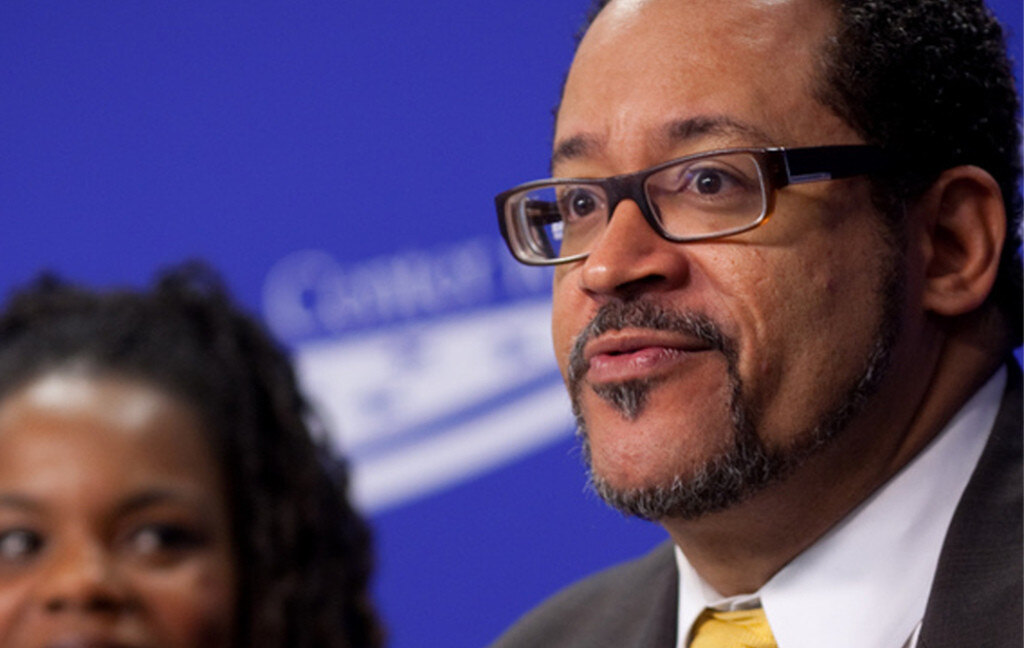
Why Does Michael Eric Dyson Think Most Black People “Can’t Make Distinctions”?
Strategic voting is not that difficult, but Dyson thinks ordinary African Americans are incapable of understanding which state they live in.
In a recent debate, Georgetown University professor Michael Eric Dyson and Princeton University professor Eddie Glaude debated the question of whether to vote for Hillary Clinton. Dyson, a Clinton supporter, argued that while there were problems with Clinton, a Trump presidency would be so damaging to black interests that a vote for Clinton was necessary. Glaude argued that by making the election solely about the fear of Trump, Democrats were trying to avoid confronting the real issues facing black communities and the very real drawbacks to Hillary Clinton’s candidacy.
Prof. Glaude was asked then asked what he recommended black voters actually do, given his criticisms. After all, if people fear Trump but detest Clinton, how are they supposed to vote?
Glaude’s reply endorsed the method that Current Affairs has also recommended: strategic voting. If you live in a swing state, vote for Clinton. If you live in a safely red or blue state, vote your conscience. That way, people in 40-something states can register their protest votes against Clinton, but people in swing states will make sure Trump doesn’t get into office.
It’s a very simple strategy. Vote based on where you live. If your third-party vote might help put Trump in office, then don’t do it. If it definitely won’t make any difference, then feel free to vote third-party or skip the presidential contest entirely.
The strategy makes perfect sense as a way to maximize people’s ability to vote based on principle, without having them accidentally throw the election like Nader in 2000.
But Michael Eric Dyson’s reply was strange. Dyson suggested that black people were incapable of understanding the concept:
I wish that black people were political scientists who could adjudicate competing claims about rationality, on the one hand, and demagoguery, on the other. I’m telling you, at the end of the day, the black people you’re concerned about, the vulnerable people you’re concerned about, can’t make distinctions—if you’re in a blue state or in a red state—they can’t color-book like that.
Glaude understandably recoiled at this bizarre reply, explaining to Dyson that he was being “condescending” and needed to have a “fundamental faith in everyday, ordinary people.” Dyson replied that he did understand ordinary people, because “I preach to them every Sunday.” The debate then descended into cross-talk as Dyson interrupted Glaude’s multiple attempts to reply.
Dyson’s comments are worth highlighting, because they demonstrate a type of argument commonly exhibited by Clinton supporters. This argument suggests that criticisms of Clinton (however valid) should be silenced, because they threaten to hand Trump the election. But strategic voting is a reply to this argument. It offers the following solution: keep criticizing Clinton, but make it clear that Trump is horrendous, and make sure swing-state voters understand the importance of keeping him out of office. That way, there is no need to lie about how good a candidate Clinton is, but there’s also no risk that the criticism will accidentally result in the loss of Ohio.
As Dyson illustrated, Clinton supporters have no real reply to this argument. All Dyson could suggest was that black people can’t understand the difference between a swing state and a safe state. Glaude pointed out that this is condescending, but “condescending” is actually too mild a word for what it is. Actually, it’s both racist and elitist. To see why, pretend that Dyson’s quotation was spoken by Donald Trump instead of a distinguished sociology professor. “The black people you’re concerned about… can’t make distinctions.” It openly declares that ordinary black people are too stupid to understand simple concepts.
Michael Eric Dyson insists that his support for Clinton acknowledges the fundamental problems with her candidacy, and the Clintons’ history of grossly mistreating black constituencies. He insists that he simply wishes to avoid a Trump presidency. But by being unwilling to support strategic voting, which aims to avoid a Trump presidency without diluting the criticisms, Dyson suggests that he is not, in fact, as critical of Clinton as he insists he is. This is not surprising. Dyson has a history of dishonestly pretending to side with the oppressed while actually simply defending the powerful.
But the issue goes beyond Dyson. Many Clinton supporters, now that the primary is over, would very much like people on the left to shut up and cease to criticize Clinton. They use the fear of a Trump presidency as a bludgeon to keep progressive detractors quiet. Yet there’s no need for this to be an either/or question. So long as Clinton critics make clear that on Election Day, they need to keep Trump out of office, they need not pretend to support Clinton anything more than grudgingly.
Evaluated fairly, Michael Eric Dyson’s comments about the reasoning capacity of black voters are outrageous. But in their “at all costs” mission to keep Trump out of power, Democrats have been increasingly sounding a lot like conservatives. But it’s perfectly possible to both reject this and reject Trump, without risking a Trump presidency.



